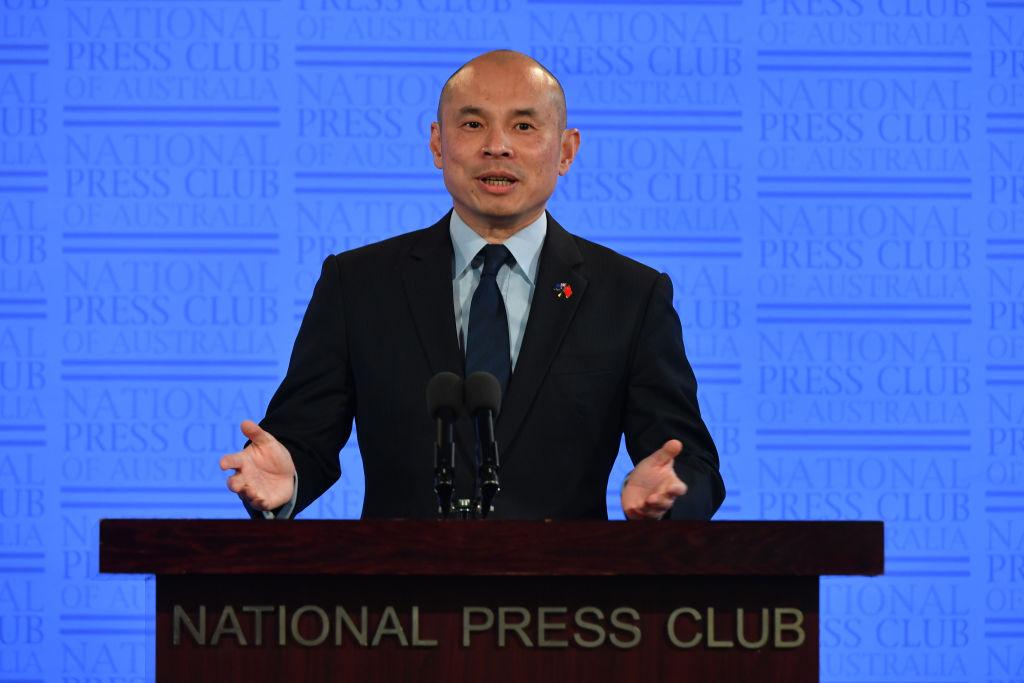
China’s deputy ambassador says Australia’s call for an independent inquiry into the origins of Covid-19 was like a knife in the feelings of the Chinese people.
In a speech to the National Press Club in Canberra, Wang Xining made clear the depth of frustration in Beijing that Australia had pushed for an inquiry into the virus, linking it to the parlous state of bilateral relations and the trade spat between the two countries.
Asked about the accusations of economic coercion levelled at China after Ambassador Cheng Jingye said that Chinese consumers may lose their taste for Australian wine and beef, among other things, Wang maintained the position that anti-dumping inquiries were purely technical.
Unprompted, Wang said Australia’s push for an inquiry was ‘approximately identical to Julius Caesar in his final day when he saw Brutus approaching him. “Et tu, Brute?”’
China, Wang said, was ‘singled out’ in late April by Australia at a time when the US was trying to put pressure on China to hide the US’s own failings—indicating there is at least a suspicion in Beijing that Australia and the US acted in concert.
‘We believe this proposal was targeted against China alone, because during that time Australian ministers claimed that the virus originated from Wuhan, from China. And they did not pinpoint any other places as a possible origin, possible source …
‘The Australian government never consulted the Chinese government in whatever way before the proposal came out. We don’t think it conforms to the spirit of comprehensive strategic partnership and it lacks the least courtesy and diplomacy …
‘More importantly, it hurts the feelings of the Chinese people … All of a sudden, they heard this shocking news of a proposal coming from Australia, which is supposed to be a good friend of China.’
Australia, however, was not under any obligation to consult China on the proposed investigation, which came about in cabinet discussions and was announced by Foreign Minister Marise Payne on 19 April.
Wang was emphatic that the inquiry that was ultimately agreed to by World Health Organization members bears no resemblance to the investigation proposed by Australia because it ‘is not targeted exclusively against any country, not guided towards the origin of the virus only’.
And while the virus may have first been detected in Wuhan, the deputy ambassador said ‘patient zero is not necessarily found among the first cluster of coronavirus cases’.
China has been working on nine vaccine candidates, Wang said. But there have been reports that it will seek to tie access to any vaccine it develops for the disease to reciprocal action, such as diplomatic recognition of its claims in the South China Sea. After noting there had already been cases of ‘emergency’ use of vaccine candidates in China, Wang said that while his government had committed to making any successful vaccine available globally, ‘we need to negotiate and have consultations with other countries to see how this public good will be applied to people around the world’.
In his prepared remarks, Wang was keen to emphasise the potential for continued expansion in Australia–China trade, which has grown from $10 billion to $235 billion a year in the past two decades.
He outlined the huge growth in bilateral investment and in the tourism and higher education markets, two sectors that have been under huge pressure from the effects of the Covid-19 pandemic—but that were also put in the spotlight by Wang’s boss in Canberra when he said Chinese tourists and students might have ‘second thoughts’ about coming to Australia.
A vow that China would open up further to foreign investment also came with a warning that hinted at Beijing’s ongoing displeasure with Australia’s decision to ban Huawei from its 5G network and again indicated that Beijing thinks there are external influences driving Australian policy.
‘I also hope Australia will remain high on the list [of country rankings for business openness], not to be dragged down for pushing foreign business or investment away on account of ill-founded and in many cases imported assertions of security breach, IP infringement and forced technology transfer.’
Wang denied that Australian ministers have been given the cold shoulder when trying to resolve the trade issues on barley, beef and wine that have come up since Canberra’s call for an investigation into the origins of Covid-19.
While Trade Minister Simon Birmingham has said that he has made multiple requests to speak with his Chinese counterpart, as recently as last week, Wang said that no such request had been received.
On the broader trends that have also caused tension in the bilateral relationship, Wang said several times that China does not interfere in the affairs of other countries, distinguishing between interference and influence.
He added that maintaining a good relationship means showing ‘respect’ for a country’s sovereignty, territorial integrity and legal systems—not-so-subtle nods to Australia’s recent rejection of China’s claims in the South China Sea, criticism of Beijing’s imposition of its national security law in Hong Kong, and suspension (along with a number of other countries) of the Australia–Hong Kong extradition treaty.
Wang may not have directly answered questions about exactly how Australia can make its way out of the diplomatic deep-freeze with China, but in describing what he called shadows over the bilateral relationship, he left less than a shadow of doubt as to why it’s ended up there.
On top of the compounding decisions that have irked Beijing on foreign interference legislation, 5G networks, Hong Kong, the US alliance and more, Australia’s push for an independent inquiry to establish the origin of the worst pandemic in a century is what’s riled China the most.